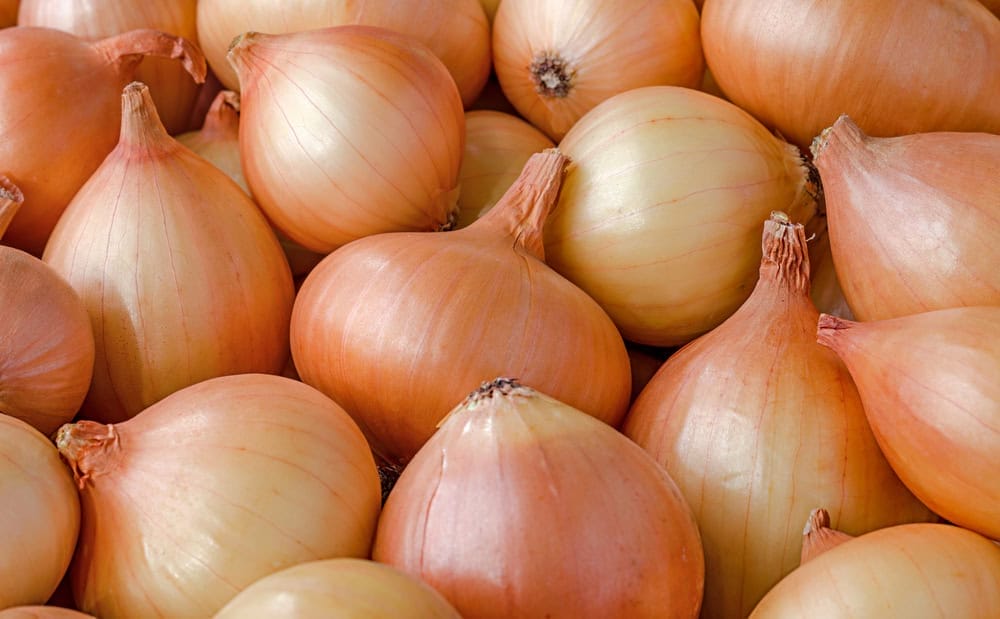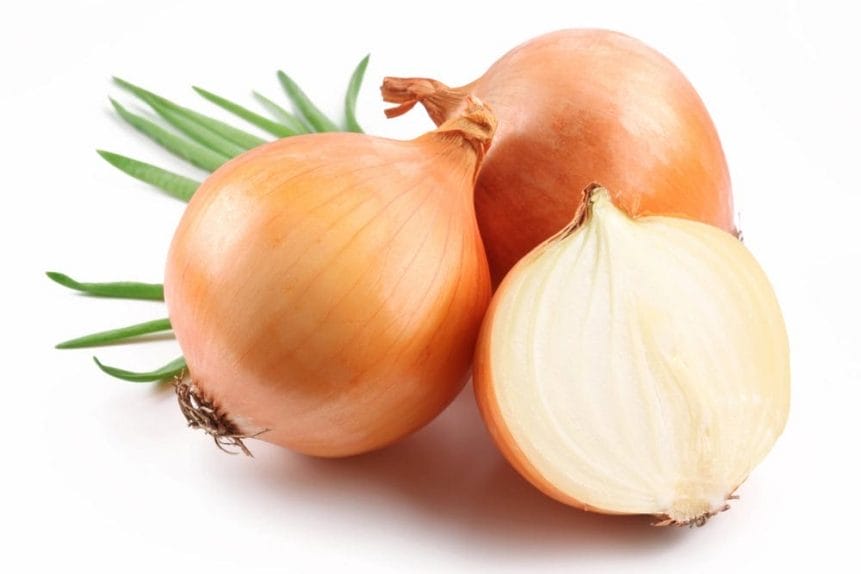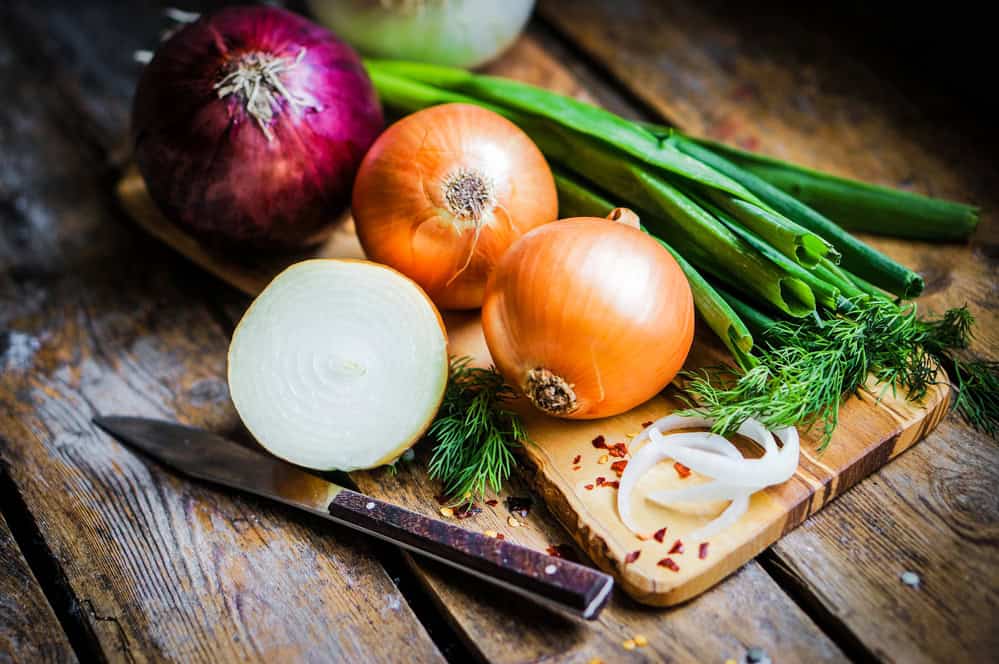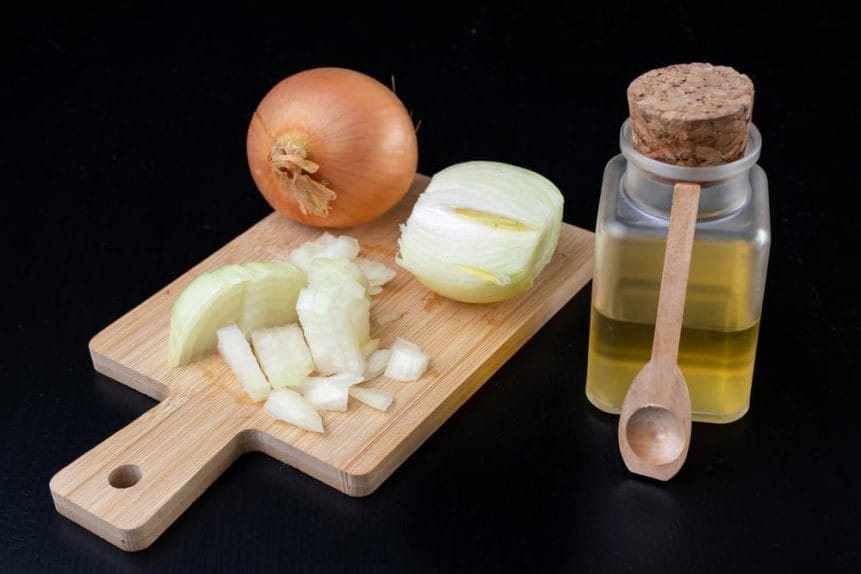
Onions – full of health with a specific smell and taste
Many vegetables, often specific to a particular region, are used in cuisine from different parts of the world, but there are also those that are used practically everywhere, and among them we can include garlic. Reading the recipes of, for example, Italian, French, Far Eastern or our native Polish cuisine, you will certainly notice that onions are just as popular. Admittedly, not everyone likes its smell and taste, but they are fully compensated by its numerous properties that promote the improvement of weakened health.
Contents
- 1 Onions – what is this vegetable?
- 2 Onions – what are their most commonly used varieties?
- 3 Onions – what valuable nutritional compounds can be found in their composition?
- 4 Onions – which of their medicinal properties are worth highlighting?
- 5 Onion – for what ailments is it worth using it?
- 5.1 Supporting digestion and metabolism:
- 5.2 Support for the heart and circulatory system
- 5.3 Prevention against diabetes
- 5.4 Counteracting the side effects of antibiotic treatment
- 5.5 Beneficial effects on the appearance and health of the skin
- 5.6 Easing the symptoms of rheumatism
- 5.7 Strengthening weakened bones and preventing osteoporosis
- 5.8 Supporting the treatment of colds and flu
- 5.9 Alleviating insect bites
- 6 Onions – are there contraindications to eating them?
Onions – what is this vegetable?
Before learning about the chemical composition, properties and effects, it is worth finding out what an onion (Allium cepa), known and valued for thousands of years, actually is. The botanical name of this vegetable may be a bit surprising, as it sounds onion garlic, belongs to the amaryllis family of plants, just like garlic, shallots and even leek. Onions came to our continent from Asia, they were first known in the Mediterranean basin, and then spread practically all over Europe.
Onions – what are their most commonly used varieties?

We usually associatethe name onion with one type of this plant, while in fact there are many varieties of it, which are used both in cooking and in natural medicine, in herbal medicine, or phytotherapy. The most significant differences between varieties are not only in appearance, but also in smell or taste, and the most common varieties of onions we use are as follows:
White onions
By far the most popular, being an addition to many dishes of cuisines from around the world. It is this variety that has the characteristic sharp, distinctive taste and smell and is called garlic.
Red onion
Distinguished by its reddish-purple color and milder flavor, so they can be eaten raw, and the flavor is imparted by the higher amount of sugar than in white. So it is perfect for salads, mixed with other equally healthy vegetables.
Sugar onions
Another variety with a sweet, extremely delicate flavor, just as suitable for a variety of healthy salads and saladssalads, is sometimes referred to interchangeably as sweet onions, and its taste is equally associated with the higher amount of simple sugars in its composition.
Spring onions
A green variety that has long stems, and it is these that serve as an accompaniment to various dishes, hot and cold. Spring onions also have a relatively mild flavor and crispness, and are commonly referred to as green onions.
Shallot
A small variety of onion having the highest amount of aromatic oils in its composition, which gives it an extremely intense aroma and flavor, noticeable especially when using shallots as an addition to hot dishes, such as sauces.
Onions – what valuable nutritional compounds can be found in their composition?
No matter which variety of onion we decide to introduce into our daily healthy and well-balanced diet, we can always count on its health-promoting effects. It is not accidental, of course, it results directly from the chemical composition of this vegetable, and it really has something to boast about.
At the same time it is worth noting that onion is a low-calorie vegetable, 100 g is only 34 kcal, it also consists mostly of water, and other compounds that it contains and that can have a beneficial effect on our health are:
- vitamin A;
- B vitamins, including vitamin B6 (pyridoxine) and vitamin B9 (folic acid);
- vitamin C;
- dietary fiber;
- quercetin;
- anthocyanins;
- beta-carotene;
- minerals such as chromium, phosphorus, magnesium, manganese, potassium, sulfur, calcium and iron;
- sulfur compounds;
- prebiotic fibers;
- fructose, sucrose and glucose.
Onions – which of their medicinal properties are worth highlighting?

As with many vegetables, the composition of onions automatically translates into its numerous medicinal properties, many confirmed by scientific studies, and experts point out, above all:
- the possibility of being used as a natural antibiotic, just like garlic;
- strong antibacterial and antiviral effects;
- strengthening the weakened immune system;
- expectorant action;
- supporting digestion and the digestive system;
- lowering and normalizing too high blood pressure;
- reducing the level of “bad” cholesterol LDL in the blood;
- raising the level of “good” HDL cholesterol;
- preventing the formation of dangerous venous clots;
- accelerating the healing of skin irritations, wounds and acne;
- slight analgesic effect;
- neutralization of some of the negative effects of alcohol consumption.
Onion – for what ailments is it worth using it?
The wide range of health-promoting effects of different varieties of onions translates into its exceptionally large range of applications, not only strictly in the kitchen, but primarily in natural medicine. Onions, most often in the form of juice, are included in many dietary supplements and other medical preparations, and the range of their use in this regard includes:
Supporting digestion and metabolism:
Which is facilitated by the high content of dietary fiber, a compound that is even essential for proper digestive processes. This is also influenced by specific groups of bacteria found in this vegetable, capable of regulating intestinal peristalsis, while allowing to avoid such ailments as bloating or constipation.
Support for the heart and circulatory system
Which is possible primarily by lowering levels of the harmful fraction of cholesterol and regulating blood pressure. This makes onions an extremely important part of the prevention of many cardiovascular diseases, including reducing the risk of myocardial infarction, stroke, atherosclerosis, thrombosis, varicose veins and coronary artery disease.
Prevention against diabetes
Not without reason considered one of the most dangerous diseases of civilization of our time, linked to, among other things, overweight and obesity. This is thanks to the presence in onions of chromium, an element that enables the regulation, eventual reduction and maintenance of blood glucose levels in accordance with standards.
Counteracting the side effects of antibiotic treatment
Onions in various forms are worth using during antibiotic treatment, and their probiotic and prebiotic properties help strengthen and rebuild the intestinal bacterial flora, especially the Bifidobacteria and Lactobacilli bacteria. This is due to the unique variety of fiber in onions, which we call fructooligosaccharide, and the effect of fighting harmful fungi.
Beneficial effects on the appearance and health of the skin
Onion’s medicinal uses include beneficial effects on skin health, so it is used to fight acne or stretch marks, among other things. It is mostly used externally, in the form of poultices, after mixing onion juice e.g. with honey, applied directly to the site of skin lesions, and the whole treatment lasts no more than a few days, giving all the desired results. It is also worth appreciating the antioxidant effect allowing the elimination of free radicals that can contribute to faster aging of the skin.
Easing the symptoms of rheumatism
If you complain of severe rheumatic joint pains, it is worth considering the implementation of an analgesic treatment, the main ingredient of which is onion. This is favored by the presence of quercetin, specifically its anti-inflammatory effect, eliminating one of the main causes of pain, namely the developing inflammation.
Strengthening weakened bones and preventing osteoporosis
A serious problem, coming with age, is weakened bones and an increased risk of osteoporosis. These should be regularly strengthened with the help of two components of onions, silicon and calcium, which can simultaneously inhibit the leaching of these elements from the body and minimize the risk of bone fractures.
Supporting the treatment of colds and flu
Syrup made from onions, often also with the addition of garlic, to alleviate the effects of colds and flu, was already used by our Mothers and Grandmothers, and its effectiveness in this regard is really hard to deny. Not only does it strengthen weakened immunity, especially during autumn-winter or spring solstice, it also has an expectorant effect to help get rid of secretions lingering in the respiratory tract.
Alleviating insect bites
Especially troublesome in summer, when we are exposed to mosquitoes, bees or wasps, among others. The site of the bite should be regularly rubbed with onion juice, relieving burning, itching and reducing swelling.In addition, the smell of onions acts as a repellent to many insects.
Onions – are there contraindications to eating them?

The numerous benefits and health properties of onions cannot be denied, unfortunately, not everyone can benefit from it. This is because there are contraindications and side effects that can hinder or even prevent its consumption, and the most important ones to consider are:
- the possibility of skin allergic reactions, rashes and itching;
- allergic reactions of the respiratory system, shortness of breath, sneezing, aggravation of asthma symptoms;
- some liver diseases;
- kidney and gall bladder diseases;
- heart muscle insufficiency;
- hypersensitivity of the digestive system, and too much consumption of onions can cause bloating, constipation, diarrhea and nausea;
- aggravation of gastric reflux symptoms;
- the possibility of a change in the odor of breath and sweat, an embarrassing problem that causes considerable psychological discomfort.
Sources:
- https://www.healthline.com/nutrition/shallot-vs-onion
- https://www.healthline.com/nutrition/best-time-to-eat-onion
- https://www.healthline.com/nutrition/disadvantages-of-onion
- https://www.healthline.com/nutrition/onion-benefits



